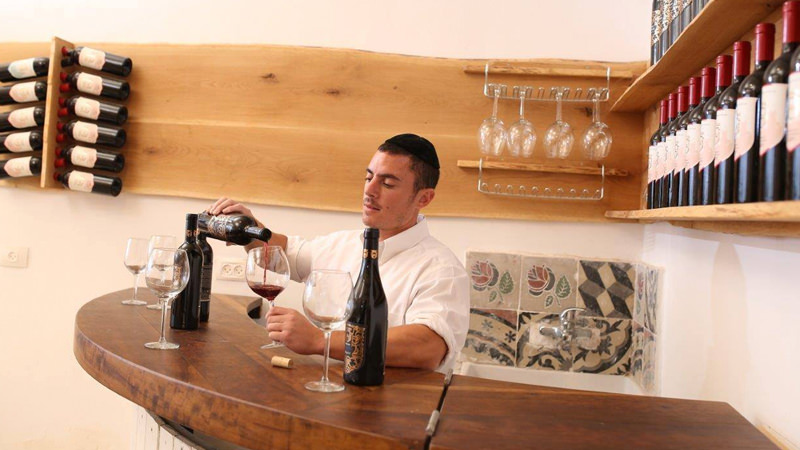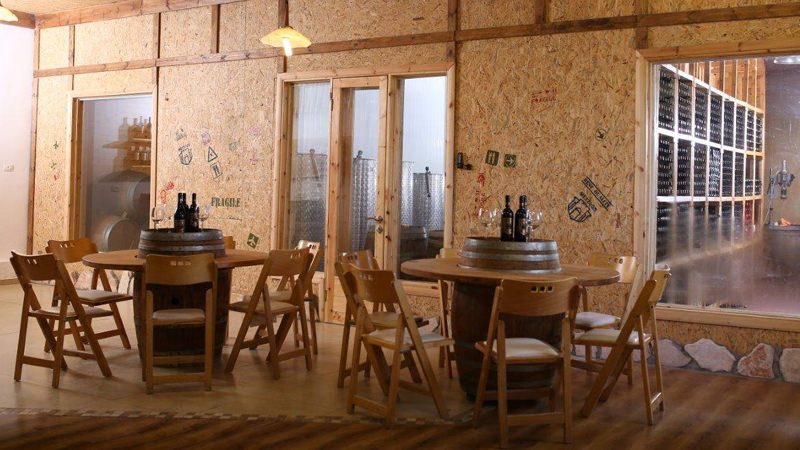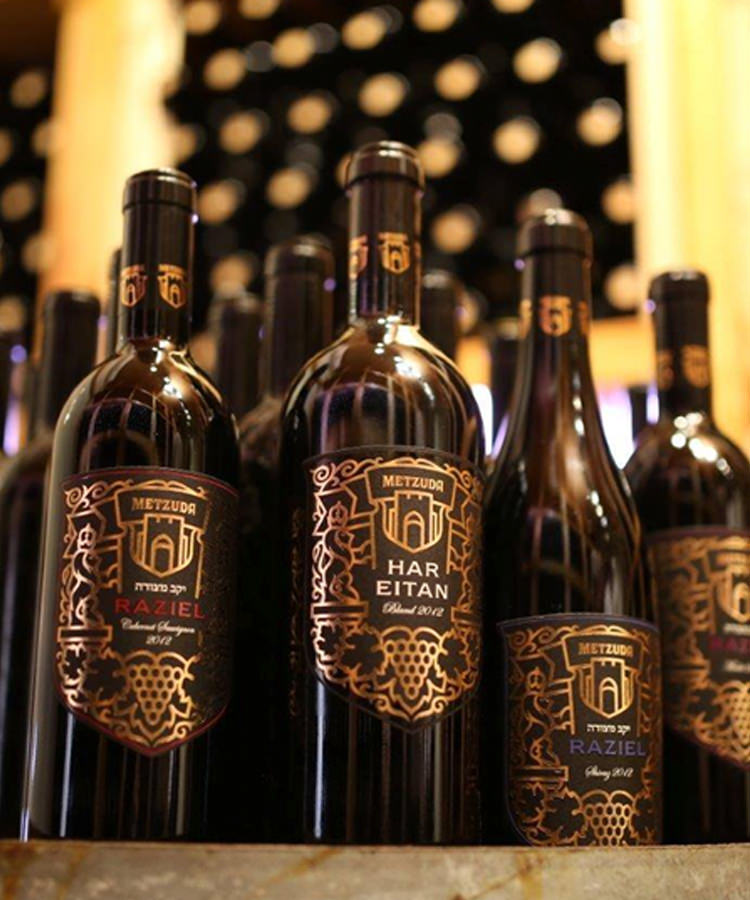Ultra-Orthodox Jews tend to live apart. Even in Israel, they have their own schools, their own politicians, their own restaurants, their own butchers. And now, they have their own wine.
Yossi Izakovitch is producing a fine wine specially for ultra-Orthodox Jews, or haredim, as they are known in Israel. Izakovitch, a father of four, opened the Metzuda winery in 2011 along with his partner, Yair Sternhard, a father of seven. In a tiny crumbling room in Jerusalem’s Bukharian quarter, they released their first vintage of 1,500 bottles in 2013. Last year, they sold 25,000 bottles — three different series of reds and their first white, a Chardonnay.
Izakovitch is not only haredi himself; he markets Metzuda’s wines mainly to haredim. “They are only beginning to understand that wine is more than just how much it costs,” he tells me. “They are maybe 15 years behind the rest of Israeli[s] when it comes to this. But some of them are beginning to understand wine and want to know more and I want to be a part of that.”
Among the haredim, who make up about 15 percent of Israel’s population, there are dozens of different sects, each with their own dress code. Izakovitch wears a long-sleeved button-down white shirt despite the summer heat, with “tzitzit” or ritual fringes hanging below the shirt. On his head is a black velvet kippah. He is clean-shaven, marking him as among the more “modern” haredim, as opposed to the those who stick with the more traditional beards.
Haredim support a strict interpretation of Jewish law, which means that Izakovitch’s education focused more on Torah learning and Jewish studies than on secular studies. Izakovitch had some catching up to do before enrolling in a winemaking course at a special institute for ultra-Orthodox Jews affiliated with Bar Ilan University. During the year-and-a-half course, they studied the theory of winemaking and worked in a winery. It led to a desire to make his own wine, he tells me.

“Wine is not just food — it’s art,” Izakovitch now says. “I like to have a connection with the people who drink my wine and who understand what I’m trying to do.”
Opening a new winery in Israel is not a simple proposition. The market is saturated, and it’s not easy to compete with Israel’s large producers like Carmel and the Golan Heights winery. It is especially difficult to sell relatively high-priced wine in the ultra-Orthodox world. Wine is used every Friday evening for the Kiddush, a blessing said at the Friday night Shabbat table, and for celebrations like weddings and circumcisions, but it is usually sweet Manischewitz-type wine, bought at the supermarket for a few dollars a bottle. The ultra-Orthodox in Israel tend to have large families and money is tight. While in the U.S., most ultra-Orthodox Jews are part of the labor market, in Israel, government statistics claim that up to 60 percent study Torah full-time, relying on their wives and the Israeli government to support them.
While secular Israelis have embraced the country’s wine revolution, ultra-Orthodox Israelis have yet to climb on board in large numbers. And Metzuda’s wines are not cheap. The entry-level series, called Sataf, offers a Cabernet and a Merlot, each aged 12 months in oak. They go for $25 a bottle. The mid-level series, called Raziel, also offers a Cabernet and a Merlot, each aged for 18 months ($35), and a Shiraz that spends 20 months in barrels and sells for almost $50. The flagship Eitan wine, a Bordeaux-style blend of Cabernet, Merlot, Petit Verdot, and a little Syrah, is lush and deep, but it costs a whopping $100, well above the budget of the vast majority of Israelis, ultra-Orthodox or not.
Perhaps for this reason, Metzuda winery sells about 25 percent of its wine in the U.S., where ultra Orthodox Jews tend to have more disposable income. As one American ultra-Orthodox man explained to VinePair, $25 is a reasonable amount to pay for a bottle of wine. “In my opinion that is just the right price for every Shabbos wine,” he said.

Ultra-Orthodox Jews in the U.S. work full-time, studying Torah in the evenings and on weekends. But being part of the labor market doesn’t only mean they have more disposable income; it also means they are more exposed to secular trends, like good food and wine. In Israel, while three-quarters of Israeli haredi women work outside the home, fewer than half of haredi men are employed even part-time, according to the Central Bureau of Statistics.
The U.S. market is a more natural fit for Metzuda, which Izakovitch seems to realize. “I want people there to get to know my wine, and then to look for it when they come to Israel,” he said.
For ultra-Orthodox Jews in Israel and in the States, one factor is paramount: the kosher certification. While many of Israel’s 300-plus wineries are kosher, few have the more stringent kosher certification that haredim demand.
When it comes to Rabbinic supervision of his wine, Izakovitch has several hechshers or certificates of kosher approval. His wines have the O.U., the U.S.-based Orthodox Union, which allows him to sell in the U.S. He also has supervision from a private ultra-Orthodox rabbi who many of his clients trust.
But when it comes to supervision from the Edah Haredit, or the ultra-Orthodox Rabbinical Council, Izikovitch demurred. To be sure that nobody is adding anything non-kosher to the wine or violating any other kosher laws, the Council – rather than Izikovitch — would hold the keys to the winery. Izikovitch would also be forbidden from directly touching open bottles or casks of wine, and would have to ask the kashrut supervisor to pour the wine if he wanted to taste from the barrel.
It’s just not for him, he says.
“I need to be able to touch my own barrels,” he says. “To make good wine, you have to have total control over the process.
